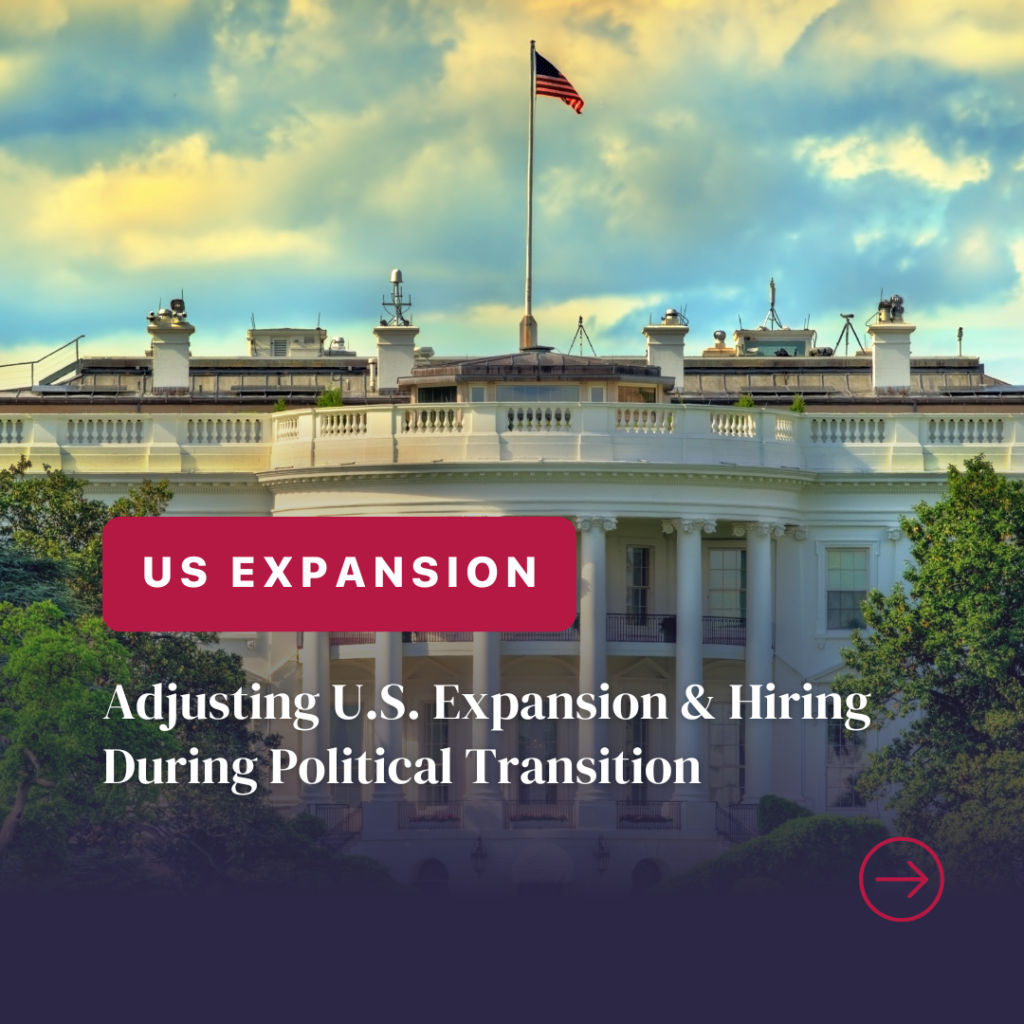Adjusting U.S. Expansion & Hiring During Political Uncertainty
As political transitions reshape U.S. immigration policies, international businesses face mounting challenges in maintaining their American operations. With visa processing delays and regulatory changes looming, companies are turning to innovative solutions like Employer of Record (EOR) services to ensure stable growth and seamless market entry, regardless of the shifting political landscape.
Understanding the Current Landscape
With Donald Trump’s election victory in 2024, the United States is entering a confirmed period of political transition. Based on historical patterns from his previous administration, international businesses can expect significant changes to immigration policies and business operations. As we prepare for this administration change, companies must understand the historical impact of similar transitions and prepare for anticipated shifts in visa processing, international hiring policies, and business immigration procedures.
With President-Elect Trump’s return to office signaling likely policy shifts similar to those implemented during his previous term, international companies are actively reassessing their strategies for establishing and maintaining their presence in the American market.
This transition becomes particularly significant given the current state of immigration processing:
- Immigration case processing backlogs reached 8.5 million cases in 2023, up from 5.7 million in 2019
- USCIS staff shortages reached 20% in critical positions during 2022-2023
- The average time to process employment-based green cards increased by 63% between 2016 and 2021
- International business travel to the U.S. decreased by 75% during policy restrictions in 2017-2019
During Trump’s previous administration (2017-2021), several vital shifts occurred in the business immigration landscape:
- H-1B visa denial rates increased from 6% in FY2015 to 24% in FY2018
- Processing times for employment-based visas increased by an average of 46%
- The suspension of entry of certain employment-based visa holders through Proclamation 10052 affected approximately 525,000 foreign workers.
- RFE (Request for Evidence) rates for L-1 visas increased to 54% in FY2019
These historical patterns, combined with campaign promises to implement stricter immigration policies, highlight the urgent need for international businesses to develop robust strategies to withstand anticipated policy changes and ensure business continuity.
Documented Impacts of Administrative Changes on Business Expansion
Historical data shows that Trump’s previous administrative transition significantly affected immigration policies and processing:
Immediate Policy Changes
When administrations change, immediate policy shifts often occur through executive orders and agency directives. During the last Trump transition in 2017:
- Visa processing protocols were modified within the first 100 days
- Additional security screening measures increased processing times by 30-45 days
- Immigration agencies implemented more restrictive interpretations of existing regulations
Long-term Effects
The ripple effects of these changes extended well beyond initial policy modifications:
- Companies reported 35% higher legal costs related to immigration compliance
- 67% of international businesses surveyed had to modify their U.S. expansion strategies
- 42% of companies delayed or canceled U.S. projects due to inability to secure necessary visas
Current Challenges and Anticipated Changes
With Trump’s return to office confirmed, businesses are preparing for similar or potentially more restrictive policies:
Visa Processing and Availability
Recent data from immigration attorneys and business organizations indicates:
- Current H-1B processing times average 4.5 months but could extend to 8-12 months under restrictive policies
- Employment-based green card backlogs exceed 1.5 million applications
- Premium processing fees have increased by 18% since 2021
Business Operations Impact
Companies are reporting:
- 58% are uncertain about their ability to maintain current staffing levels
- 73% are concerned about their capacity to hire key personnel from overseas
- 82% of tech companies reported delayed product launches due to talent shortages
- International businesses spend an average of $250,000 extra per year on immigration-related legal fees
- Companies reported an average delay of 8.5 months in critical project timelines due to visa issues
- 65% of businesses reported losing potential contracts due to inability to staff projects adequately
These statistics clearly show the challenges international businesses face during political transitions. However, they also reveal a significant trend: companies that maintain flexible operational structures and alternative hiring strategies are better positioned to weather policy changes. This has led to a substantial shift in how international businesses approach U.S. expansion, with many seeking solutions that reduce their dependency on traditional immigration pathways.
Faced with these daunting statistics and the confirmed administrative transition, international businesses actively seek alternatives to traditional expansion methods that rely heavily on visa approvals and immigration processes. The need for a more stable, predictable approach to U.S. market entry and team building has never been more critical.
A Strategic Solution for Uncertain Times
Employer of Record (EOR) services provide international businesses the opportunity to hire US employees without setting up a US entity or bank account. This hiring model is much simpler than setting up an entity and sending key employees on residential business visas. The concern for some founders is that imparting corporate knowledge and culture is facilitated by the presence of key personnel from the home country. While this is a logical strategy, our CEO, Joanne Farquharson, shares her experience over the past ten years working with founders contemplating this approach.

Recent market analysis shows that EOR adoption has increased by 196% since 2020, with the highest growth occurring in sectors most affected by immigration restrictions, such as technology, manufacturing, and professional services. This dramatic shift indicates that businesses are not just seeking temporary solutions but are fundamentally rethinking their approach to international expansion.
The EOR model has emerged as a transformative solution, offering companies a way to maintain their U.S. presence and continue hiring without being directly impacted by immigration policy changes. By separating the ability to hire and operate in the U.S. from the complexities of business immigration, EOR services provide a practical pathway for international companies to maintain business continuity regardless of political shifts.
Key performance indicators demonstrate the effectiveness of this approach:
- Companies using EOR services reported 47% faster market entry compared to traditional entity setup
- 89% of businesses using EOR services maintained continuous operations during policy changes
- Average cost savings of 35% in the first year compared to establishing a legal entity
- 93% reduction in compliance-related issues when using EOR services versus self-managed expansion
Strategic Advantages of EOR Solutions
Speed to Market
The speed-to-market advantage offered by EOR services cannot be overstated. While traditional entity setup can take three to six months and involve significant legal and administrative costs, an EOR allows you to begin operations in as little as one week. This rapid deployment capability becomes particularly valuable as the new administration takes office and companies need to adjust their strategies quickly.
Compliance Assurance
Compliance assurance represents another critical advantage of the EOR model. The United States presents a unique challenge for international businesses due to its complex web of federal, state, and local employment laws. Each state operates almost like a separate country regarding employment regulations, with its rules governing everything from overtime pay to sick leave policies. An EOR maintains dedicated legal and compliance teams that stay current with these ever-changing regulations across all U.S. jurisdictions.
Risk Mitigation
Risk mitigation through an EOR partnership extends beyond mere regulatory compliance. When you utilize an EOR service, they assume the legal responsibilities and risks associated with employment, including liability for employment-related claims, proper tax withholding and reporting, and maintenance of appropriate insurance coverage. This transfer of risk becomes especially valuable during periods of political uncertainty when employment regulations and enforcement priorities may change rapidly.
Understanding EOR as a Transitional Strategy
The flexibility of the EOR model has proven particularly valuable during political transitions:
- EOR users reported 42% lower employee turnover compared to direct employment during periods of policy uncertainty
- 85% of businesses using EOR services maintained their growth trajectories during visa restriction periods
- Companies using EOR services showed a 67% higher success rate in retention during political transitions
Looking Ahead: 2025 and Beyond
Industry analysts predict several key trends:
- EOR services will become the primary entry method for 60% of international businesses entering the U.S. market
- Companies will increasingly adopt hybrid models combining EOR services with traditional entity establishment
- The role of EOR services will expand to include more comprehensive business support services
- Technology integration will further streamline the EOR model, making it even more efficient and cost-effective
Conclusion
With President-Elect Trump’s return to office and the likelihood of stricter immigration policies, international businesses must adopt flexible strategies to maintain their market presence and growth trajectory. The correlation between political transitions and business disruption is clear, but the emergence of EOR services as a strategic solution has created a new paradigm for international business expansion.
Companies that embrace this model position themselves to maintain stability and growth regardless of the political climate, while those that rely solely on traditional methods may face increasing challenges in an uncertain regulatory environment. By leveraging an EOR service, businesses can continue their U.S. expansion plans while minimizing exposure to policy changes and maintaining operational efficiency.
The choice of an EOR partner should be based on their experience, track record of compliance, and ability to provide comprehensive support across all aspects of employment management. This ensures that your business can maintain its momentum regardless of the political climate or policy changes that may occur.
Successful market entry and expansion require careful planning and the right partners. Whether you’re just beginning your U.S. journey or adapting your existing presence, Foothold America’s EOR service can provide the stability and support needed to achieve your business objectives in any political climate.
Laurie Spicer
UK Based
Over 25 years experience doing business in North American, European, and Asian markets with a primary focus and specialism on the complexity of the US market.
Lamar Manning
UK Based
Experienced HR professional with over 11 years of experience in driving business growth. Possessing dual US and UK citizenship, Lamar has experience in US HR, payroll and recruitment, bringing a unique perspective and international expertise to his approach.

